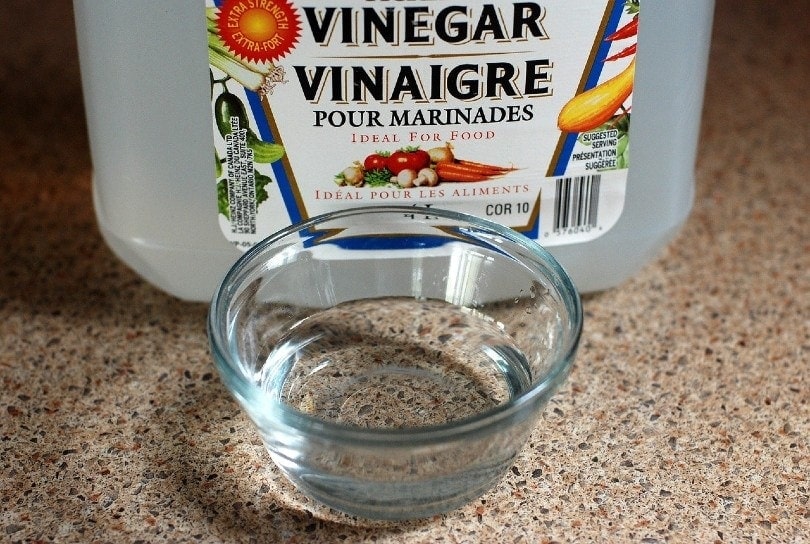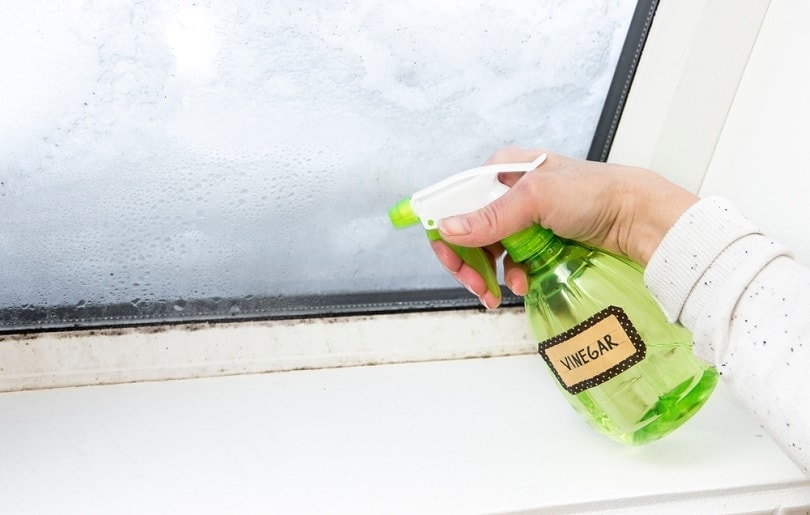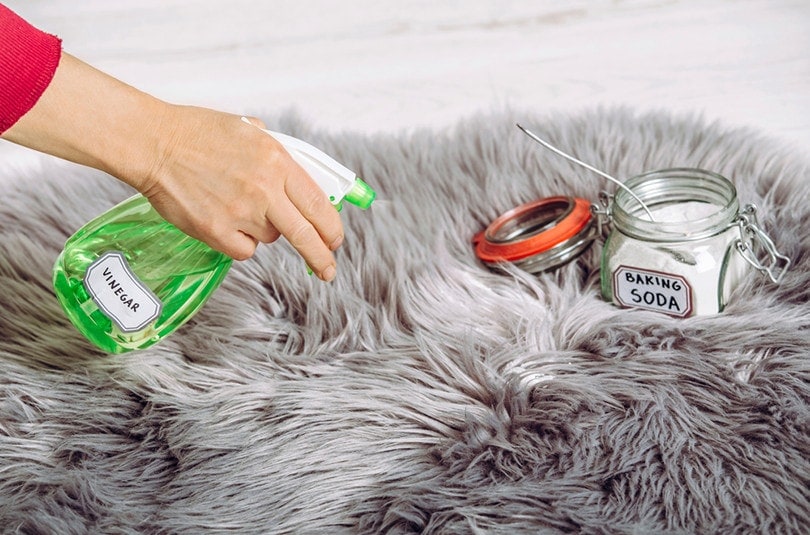Does Vinegar Keep Cats Away? Is It the Best Choice?
Updated on

Many people love cats, but not everyone loves the mess and destruction that comes with having one. Cats are curious creatures with a penchant for mischief. Unfortunately, this can sometimes get them into trouble. Even the most well-intentioned kitty can wreak havoc on an unsuspecting home when left to their own devices. This is why many people who keep cats as pets invest in some sort of cat deterrent to keep them out of certain areas of the house.
There are several different cat deterrents on the market, each with unique pros and cons. In this article, we explore vinegar, one of the most common DIY cat deterrents. We also review other methods to keep cats at bay and determine which ones are worth your time (and budget).
Vinegar
Vinegar is one of the most recommended cat deterrents and for good reason. Many people swear by it as a cheap, effective way to repel cats from your home, garden, or yard. The active ingredient in vinegar that’s thought to repel cats is acetic acid, which is a weak acid that is commonly used as a preservative, disinfectant, and fungicide. If cats smell vinegar, they may be discouraged from entering the area where they detected it. If they do decide to enter the area, they may experience mild irritation to their paws, which may be enough to keep them away.
Unfortunately, the effectiveness of this trick is not completely consistent and relies heavily on the cat’s initial reaction to the smell. Since every cat’s experience and sense of smell is different, it may or may not be effective in keeping them away. Vinegar is also not ideal for use inside the house because its smell is quite strong. You may want to consider an alternative if you’re sensitive to strong odors or want something that could potentially be less noticeable than vinegar.

Why and When Vinegar Works Best
Vinegar is most effective in preventing cats from entering a specific area and is less effective at keeping cats out of the yard entirely. It’s best used when fresh and strong. Vinegar loses its potency over time, so if you use it as a deterrent, you may need to replace it occasionally.
How to Use Vinegar to Keep Cats Away
You can spray vinegar in outdoor areas where cats constantly pee, or you can suspend vinegar-soaked strips around the yard. You can mix white vinegar with water and drop it into a spray bottle to use as an easy way to get that smell into places where you want to deter cats. All you need to do is pour vinegar into a bottle and spray it over places in your yard that cats consistently use as a litter box.
To keep cats out of an indoor space, dab vinegar on doorways, windowsills, and other areas where cats might enter. However, since vinegar has a pungent smell, you may want to choose places where it won’t be too noticeable. Alternatively, you can spray it in a fine mist around the space.
Safety Tips for Using Vinegar to Keep Cats Away
Vinegar can be used to safely keep cats at bay. But it is important to note that some cats may have a mild reaction to it, such as an upset stomach or even vomiting. To ensure that it doesn’t make your kitty sick, dilute the vinegar with water before using it. You should also be careful when using vinegar in a confined space, such as a small room. Try to keep it away from any surfaces that your cat may be able to sniff or lick.

Other Cat Deterrent Methods
There are several other sprays that can be used to deter cats from unwanted areas. While vinegar is the cheapest and most common, there are a few other sprays that can be effective:
- Pepper spray: Pepper spray is a good cat repellent that can be used indoors or outdoors. It’s commonly used for training or keeping dogs away from certain areas, but it can also be effective for cats.
- Citrus sprays: Citrus is another common indoor cat deterrent. It’s thought to be less effective than vinegar, but it’s still worth a try if you’re looking to keep cats out of a specific indoor area. You can also use your favorite herbs to make a spray that will infuse your home with beautiful aromas, which will repel cats without the space smelling like vinegar. Make a citron-scented spray using diluted lemon juice in water — an equal amount of each — and then spray over areas where you want cats to stay away.
Ultrasonic Cat Deterrents
While not technically a cat deterrent in the way that sprays are, sound deterrents can be a good investment if you’re tired of your cat scratching furniture in your home. By playing a loud, high-pitched sound when the cat starts to scratch, you can train them to cease their destructive behavior and move on to another, more preferable activity. These sound deterrents are not just for scratching, though. Researchers have found that ultrasonic repellents are also effective at keeping felines away from gardens. So, they can be a cost-effective and humane option to reduce the incursions of unwanted cats. Keep in mind that these ultrasonic deterrents will not prevent all incursions, but they will reduce their frequency and duration. Overall, these are useful tools for those who have particularly persistent cats or small kittens that are still learning what areas of the home are off-limits.
Motion-Activated Devices
Motion-activated deterrents, like PetSafe SSSCAT Motion-Activated Dog & Cat Spray, are among the most effective and fun ways to keep cats away from areas of your home where they don’t belong. These devices work via a motion sensor that when activated, triggers a loud and startling noise that is both uncomfortable and displeasing to cats. These devices are great for deterring stray cats from coming into your yard when you’re not there to shoo them away. However, while these devices won’t harm cats and can be reset easily, they should be used with care if you have small children.

Final Thoughts
Vinegar is a common home remedy for keeping cats away, probably because it’s cheap and easy to acquire. Additionally, vinegar has antimicrobial properties that can help prevent the growth of bacteria and fungi in the environment. These make it an effective remedy for eliminating cat pee odor. Vinegar can also mask other unpleasant odors that might attract cats, such as those from garbage, pet waste, or food scraps.
However, a cat’s intelligence makes it harder to keep them completely at bay. That’s why you should try a combination of cat repellents, such as citrus or pepper sprays. You can also opt for ultrasonic deterrents or motion-activated devices, which do require a bigger investment than vinegar but can be useful in keeping stubborn cats away.
Featured Image Credit: focal point, Shutterstock











